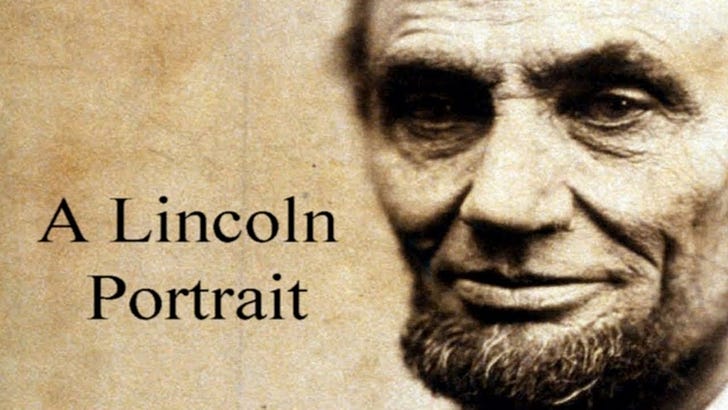Just a short bit for you today. Today is the 161st anniversary of Abraham Lincoln’s Gettysburg Address, delivered on November 19th, 1863. Recently I learned about a piece of music written by Aaron Copland in 1942 to honor Abraham Lincoln. When I listened to it this morning I found it incredibly moving, and decided to share it with you. Copland’s 17-minute piece for orchestra includes a part for a narrator, beginning half-way through the piece, overlaying words by and about Lincoln.
I’ve picked two versions to recommend for you.
Watch it here, with the Seattle Symphony Orchestra, and James Earl Jones narrating, accompanied by a montage of Lincoln and his times.
Or watch this version that I appreciate, showing just the orchestra and narrator — no montage. This shows a performance in Hamburg, Germany in 2022, with the NDR Elbphilharmonie Orchestra, Morris Robinson narrating. Beautiful.
Below are the quotes from Lincoln speeches that Copland incorporated into his musical setting.
Fellow citizens, we cannot escape history. We of this congress and this administration will be remembered in spite of ourselves. No personal significance or insignificance can spare one or another of us. The fiery trial through which we pass will light us down in honor or dishonor to the latest generation. We, even we here, hold the power and bear the responsibility. (Annual Message to Congress [since the twentieth century, State of the Union], December 1, 1862)
The dogmas of the quiet past are inadequate to the stormy present. The occasion is piled high with difficulty and we must rise with the occasion. As our case is new, so we must think anew and act anew. We must disenthrall ourselves and then we shall save our country. (Annual Message to Congress, December 1, 1862)
It is the eternal struggle between two principles, right and wrong, throughout the world. It is the same spirit that says 'you toil and work and earn bread, and I'll eat it.' No matter in what shape it comes, whether from the mouth of a king who seeks to bestride the people of his own nation, and live by the fruit of their labor, or from one race of men as an apology for enslaving another race, it is the same tyrannical principle. (Lincoln–Douglas debates, October 15, 1858)
As I would not be a slave, so I would not be a master. This expresses my idea of democracy. Whatever differs from this, to the extent of the difference, is no democracy.
That from these honored dead we take increased devotion to that cause for which they gave the last full measure of devotion. That we here highly resolve that these dead shall not have died in vain. That this nation under God shall have a new birth of freedom and that government of the people, by the people, and for the people shall not perish from the earth. (Gettysburg Address)
Indeed, Fellow citizens, we cannot escape history.
Chris



